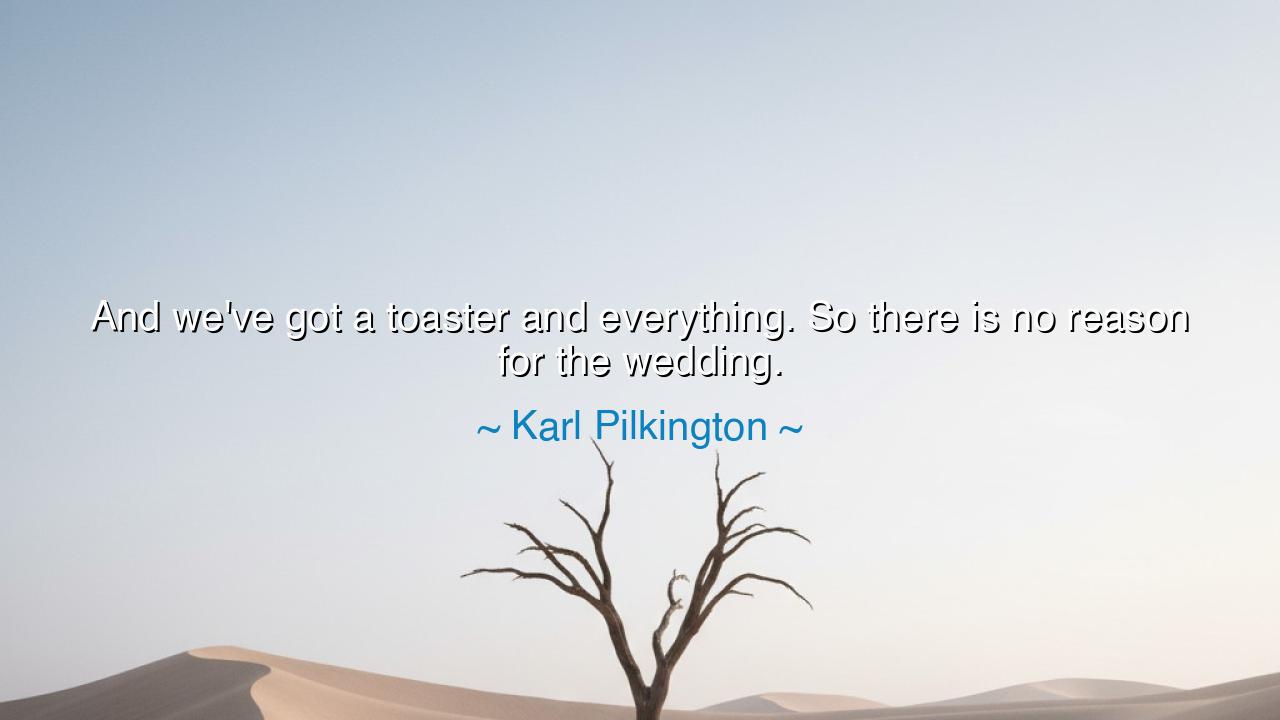
And we've got a toaster and everything. So there is no reason






In this lighthearted yet profound utterance, Karl Pilkington speaks of the changing nature of tradition and the symbols that once defined it. The toaster, a simple household item, becomes a metaphor for completion and readiness. In many cultures, weddings were not merely ceremonies of love but practical unions, often marked by gifts to help the couple build their new life together. By saying, “We’ve got a toaster and everything,” Pilkington humorously suggests that the symbolic markers of marriage are already fulfilled, making the wedding itself feel unnecessary. Beneath the humor lies a subtle reflection on how society’s rituals evolve over time.
The origin of this idea can be traced to the modern shift from marriage as a necessity to marriage as a choice. In earlier centuries, a wedding was a binding alliance—between families, between communities, and for economic survival. Gifts like blankets, tools, or livestock were essential for establishing a household. Today, however, many couples live together before marriage and already possess the things they need. Thus, the wedding ceremony, once a cornerstone of life, may feel to some like an ornament rather than a foundation. Pilkington’s quip captures this transformation with wit and simplicity.
History offers a striking parallel in the ancient Roman dowry system. In those days, a bride brought wealth and goods to her marriage to ensure the new household’s stability. These exchanges were so significant that entire laws revolved around them. Imagine a Roman hearing Pilkington’s words: to have a toaster—a symbol of modern comfort—without the formal rites of marriage would seem unthinkable. Yet as centuries passed, just as Roman traditions faded, so too have many modern expectations shifted, proving that customs are not eternal, but ever-changing.
There is also a lesson here about symbols and meaning. A toaster, while practical, represents the tangible, physical side of union. The wedding, on the other hand, represents the intangible bonds of love, trust, and community. Pilkington’s jest invites us to reflect on what truly matters: is it the objects we collect, or the sacred vow that binds two souls together? Just as a knight’s sword was once a tool of survival and later became a ceremonial relic, so too can a wedding shift from necessity to symbolic gesture.
Ultimately, this quote reminds future generations that while traditions are precious, they must not overshadow the heart of the union. Whether a couple chooses to wed with great ceremony or live simply with a toaster on their counter, the essence lies in their commitment to one another. Let this be a teaching: honor rituals, but do not be enslaved by them. For love is not proven by the grandeur of a feast or the number of gifts, but by the quiet, daily acts of care that build a life together.






BCBabi Chicken
Karl Pilkington’s take on weddings, while humorous, touches on an interesting point about the sometimes unnecessary extravagance surrounding weddings. When it boils down to it, do we really need all the pomp and circumstance when you already have the essentials, like a toaster? Could this be a reflection of how society views love and commitment through a materialistic lens? Do you think weddings have become more about show than substance?
APNguyen An Phu
I find Karl Pilkington's perspective on weddings quite refreshing. His idea that a toaster could be the only thing you need seems to reflect a more practical approach to relationships. But it also raises an interesting question: why do we put so much focus on the ritual of weddings instead of focusing on the relationship itself? Is the wedding more about public recognition or a reflection of personal commitment?
NMNguyen Mai
Karl Pilkington’s thoughts on weddings are amusing, and yet they make a valid point. We often get caught up in the idea of a big event, like a wedding, when perhaps the true essence of a relationship is found in the day-to-day moments—like having a toaster. Does that mean weddings are overrated, or is there a deeper meaning to the ceremony that we can’t dismiss so easily? Can love really be celebrated in simpler ways?
TDtran dinh
Karl Pilkington’s take on weddings is both humorous and somewhat relatable. It’s true that people often invest so much into the idea of a wedding when, in the end, it’s the little things like the toaster that really matter. But do we overlook the deeper meaning of weddings, or is it simply the ritual that has been embedded in our culture? How much do you think a wedding ceremony actually impacts the strength of a relationship?
GPNguyen Gia Phuc
Karl Pilkington’s comment about the toaster sums up a sentiment that many people might feel—why do we need a big wedding if we already have the essentials? It’s funny, but it also raises the question of why society places such importance on weddings. Are they about celebrating love, or is it more about fulfilling societal expectations? Do you think the ceremony adds something significant to a relationship, or is it just an expensive formality?